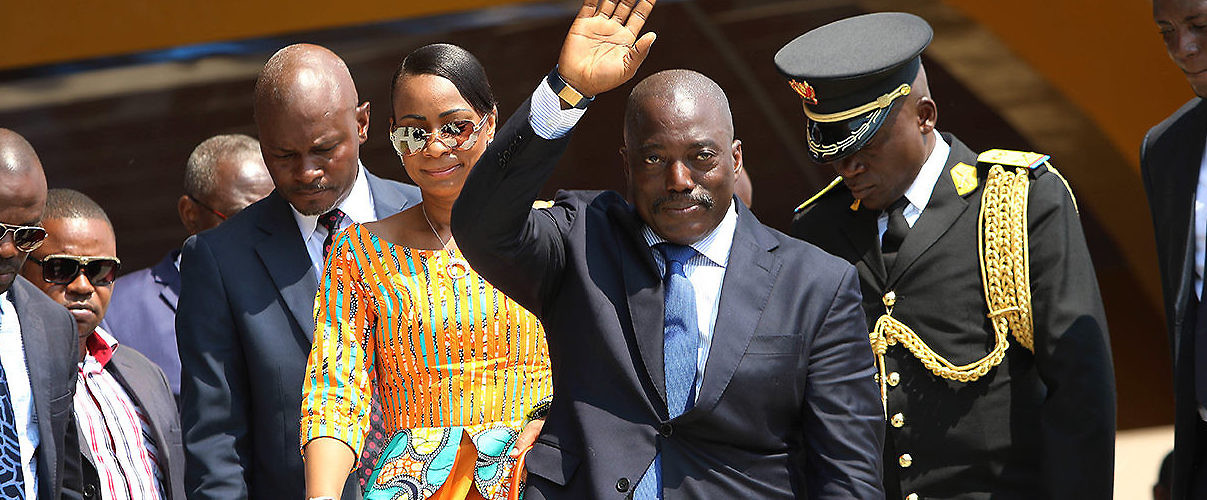DRC President Joseph Kabila waves to supporters at the country's independence celebrations. Kindu, Democratic Republic of the Congo, June 30, 2016. (John Bompengo/AP Photo)
June’s sentencing of opposition leader Moise Katumbi to three years in prison is the latest indication of suspected political influence over judiciary decision-making in the Democratic Republic of the Congo. Former Haut-Katanga Governor Katumbi was prosecuted in absentia for allegedly selling his familial home despite not owning its title deed—a verdict his legal team intends to appeal. The ruling comes amid another judicial process targeting Katumbi for hiring foreign nationals in his personal security detail, which his lawyers deem permissible under the DRC’s laws.
These charges also follow a May edict by the DRC’s Constitutional Court that President Joseph Kabila would be legally allowed to extend his presidency beyond its expiration on December 20 this year if a scheduled election were delayed past that point. There is good reason to consider these legal decisions as related, with sustained political instability seen as the key to delaying a vote and to Kabila maintaining his grip on power.
In recent months, Kabila has repeatedly sought a way to render himself eligible for reelection despite being barred from serving more than two terms. His attempts to amend the constitutional clause regulating term limits incited widespread protests in August 2015 and January 2016, which spread from the riverside capital of Kinshasa to outlying cities such as Bukavu, Goma, and Kisangani. Any further moves by Kabila to seek a third term are likely to elicit similar unrest.
Under the circumstances, postponing the ballot pending a definitive rejection of Kabila’s tactics is probably the safest and most effective means of maintaining the tenuous political status quo. While delays would undoubtedly serves the president’s interests, forging ahead with the November poll could ultimately be more destabilizing without some larger resolution.
With its efforts to extend Kabila’s presidency ongoing, the DRC government has shown itself woefully unprepared, perhaps deliberately so, to organize an election that could be deemed legitimate by the opposition and independent observers. A resulting government would subsequently suffer from this same lack of legitimacy, including internationally.
By association, the DRC’s Independent National Electoral Commission (CENI) remains equally unprepared for November. In a leaked 2015 communiqué its officials noted that the organization had received a mere 17% of funding required to organize the ballot. The letter was alleged to have been drafted in response to government spokesman Lambert Mende’s claim that CENI had been provided sufficient funding for the purpose. In response, Mende said the $1 billion estimated cost of the elections was excessive in a country with a national budget of just $8 billion.
Time is also a crucial factor. CENI noted in January 2016 that it would need at least 18 months to ready the country’s electoral roll before any legitimate voting process could be held. This would mean elections being held mid-2017 at the very earliest. While questions have been raised as to why this timeframe is nearly triple the average of preparatory phases preceding both the 2006 and 2011 elections, little has been done to update the country’s voter roll—an undertaking deemed by DRC analyst Christophe Vogel as the sine qua non to holding credible elections. Even if an earnest attempt at updating the voter registry was to commence soon, in a country the size of Western Europe, yet far less accessible, the most optimistic of timeframes would still voting taking place in 2017.
Finally, there is the issue of security. For an inclusive, free, and fair ballot to be held, the government would need to guarantee the safety of the electorate. The task seems almost insurmountable at present, with myriad armed actors operating in the country’s insurgent-embattled northeastern provinces, where violence has displaced an estimated 2.2 million people since 2012. In addition to placing the lives both of voters and electoral organizers at risk, holding elections in such a climate could lead to further insecurity. This was exemplified following the DRC’s 2011 elections, when accusations of malfeasance against Kabila was among the self-proclaimed motivations for the formation of the so-called March 23 Movement, which posed one of the most significant threats to the incumbent’s tenure, up until its disbanding in November 2013.
The key to maintain security in the DRC will be ensuring a perception of legitimacy of state institutions among the public throughout the current political crisis. Questions regarding the fairness of Katumbi’s trial have already seen his supporters partake in violent and disruptive protests in the city of Lubumbashi. Whether these protests will translate into wider instability will be dependent on perception of the judiciary’s legitimacy in issuing its rulings.
Similarly, the DRC’s level of overall political stability will be dependent on the manner in which the upcoming elections are perceived to be taking place. While much attention has focused on the instability that could be wrought by Kabila’s illegitimate possible third-term bid, the fallout of an illegitimate electoral process in which he doesn’t ultimately participate could also be massive.





